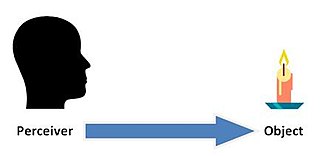
Sir Alfred Jules "Freddie" Ayer, usually cited as A. J. Ayer, was an English philosopher known for his promotion of logical positivism, particularly in his books Language, Truth, and Logic (1936) and The Problem of Knowledge (1956).
Metaphilosophy is "the investigation of the nature of philosophy". Its subject matter includes the aims of philosophy, the boundaries of philosophy, and its methods. Thus, while philosophy characteristically inquires into the nature of being, the reality of objects, the possibility of knowledge, the nature of truth, and so on, metaphilosophy is the self-reflective inquiry into the nature, aims, and methods of the activity that makes these kinds of inquiries, by asking what is philosophy itself, what sorts of questions it should ask, how it might pose and answer them, and what it can achieve in doing so. It is considered by some to be a subject prior and preparatory to philosophy, while others see it as inherently a part of philosophy, or automatically a part of philosophy while others adopt some combination of these views. The interest in metaphilosophy led to the establishment of the journal Metaphilosophy in January 1970.

John Edward Warnock is an American computer scientist and businessman best known as the co-founder with Charles Geschke of Adobe Systems Inc., the graphics and publishing software company. Warnock was President of Adobe for his first two years and chairman and CEO for his remaining sixteen years at the company. Although retired as CEO in 2000, he still co-chairs the board with Geschke. Warnock has pioneered the development of graphics, publishing, Web and electronic document technologies that have revolutionized the field of publishing and visual communications.
John Langshaw Austin was a British philosopher of language and leading proponent of ordinary language philosophy, perhaps best known for developing the theory of speech acts.

David Kellogg Lewis was an American philosopher. Lewis taught briefly at UCLA and then at Princeton from 1970 until his death. He is also closely associated with Australia, whose philosophical community he visited almost annually for more than thirty years. He made contributions in philosophy of language, philosophy of mind, philosophy of probability, metaphysics, epistemology, philosophical logic, and aesthetics. He is probably best known for his controversial modal realist stance:
(i) Possible worlds exist.
(ii) Every possible world is a concrete entity.
(iii) Any possible world is causally and spatiotemporally isolated from any other possible world.
(iv) Our world is among the possible worlds.

Sir Bernard Arthur Owen Williams, FBA was an English moral philosopher. His publications include Problems of the Self (1973), Ethics and the Limits of Philosophy (1985), Shame and Necessity (1993), and Truth and Truthfulness (2002). He was knighted in 1999.
Ordinary language philosophy is a philosophical methodology that sees traditional philosophical problems as rooted in misunderstandings philosophers develop by distorting or forgetting what words actually mean in everyday use. "Such 'philosophical' uses of language, on this view, create the very philosophical problems they are employed to solve." Ordinary language philosophy is a branch of linguistic philosophy closely related to logical positivism.

In philosophy of mind, naïve realism, also known as direct realism, common sense realism or perceptual realism, is the idea that the senses provide us with direct awareness of objects as they really are. Objects obey the laws of physics and retain all their properties whether or not there is anyone to observe them. They are composed of matter, occupy space and have properties, such as size, shape, texture, smell, taste and colour, that are usually perceived correctly.

20th-century philosophy saw the development of a number of new philosophical schools—including logical positivism, analytic philosophy, phenomenology, existentialism, and poststructuralism. In terms of the eras of philosophy, it is usually labelled as contemporary philosophy.
Peter K. Unger is a contemporary American philosopher and professor at New York University. His main interests lie in the fields of metaphysics, epistemology, ethics, and the philosophy of mind.

Sense and Sensibilia is one of the short treatises by Aristotle that make up the Parva Naturalia.
Sir Geoffrey James Warnock was a philosopher and Vice-Chancellor of Oxford University. Before his knighthood, he was commonly known as G. J. Warnock.
David Sosa is an American philosopher who is currently Professor of Philosophy and Chair of the Department of Philosophy at the University of Texas, Austin. He received his undergraduate degree from Brown University and a doctorate in philosophy from Princeton University. His PhD dissertation, completed in 1996 under the supervision of Mark Johnston (philosopher), was titled "Representing Thoughts and Language". Before moving to Texas, Sosa was a post-doctoral fellow at U.C. Berkeley and an assistant professor of philosophy at Dartmouth College. He is the son of the philosopher Ernest Sosa.
Sense and Sensibilia is the title of:

Quietism in philosophy is an approach to the subject that sees the role of philosophy as broadly therapeutic or remedial. Quietist philosophers believe that philosophy has no positive thesis to contribute, but rather that its value is in defusing confusions in the linguistic and conceptual frameworks of other subjects, including non-quietist philosophy. By re-formulating supposed problems in a way that makes the misguided reasoning from which they arise apparent, the quietist hopes to put an end to humanity's confusion, and help return to a state of intellectual quietude.

James Opie Urmson, usually cited as J. O. Urmson, was a philosopher and classicist who spent most of his professional career at Corpus Christi College, Oxford. He was a prolific author and expert on a number of topics including British analytic/linguistic philosophy, George Berkeley, ethics, and Greek philosophy.
The argument from illusion is an argument for the existence of sense-data. It is posed as a criticism of direct realism.
The Faculty of Philosophy, University of Oxford was founded in 2001. It is part of Oxford's Humanities Division. The faculty is located next to Somerville College on Woodstock Road.
This is an index of articles in philosophy of language








